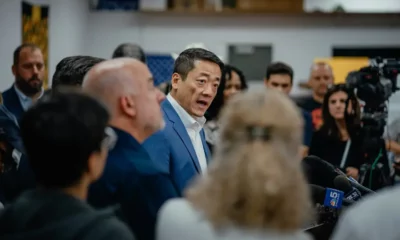Mississippi Today
Their families said they needed treatment. Mississippi officials threw them in jail without charges.
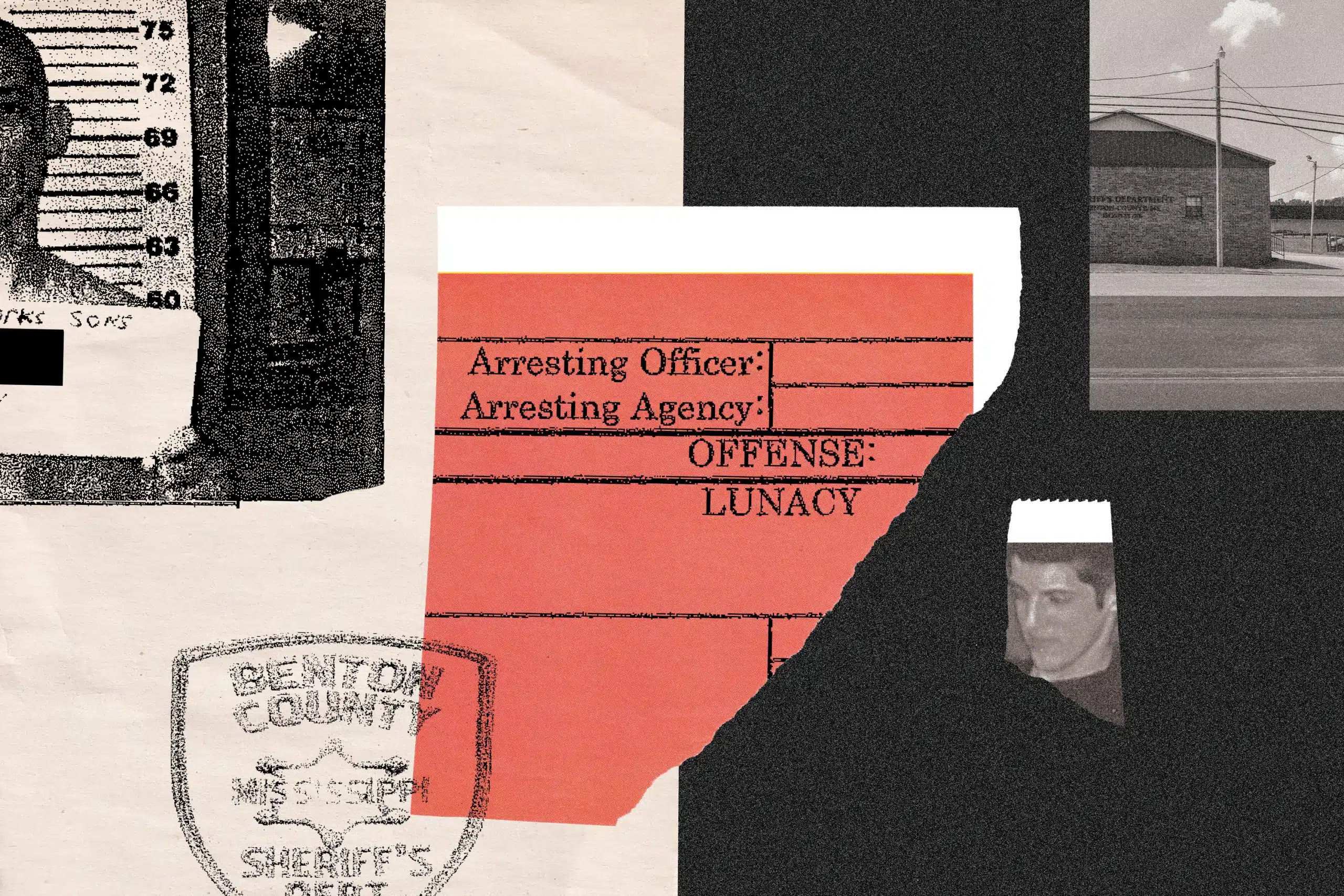
This article contains detailed descriptions of mental illness and suicide. If you or someone you know needs help:
- Call the National Suicide Prevention Lifeline: 988
- Text the Crisis Text Line from anywhere in the U.S. to reach a crisis counselor: 741741
This article was produced for ProPublica’s Local Reporting Network in partnership with Mississippi Today. Sign up for Dispatches to get stories like this one as soon as they are published.
When sheriff’s department staff in Mississippi’s Benton County took Jimmy Sons into custody several years ago, they followed their standard protocol for people charged with a crime: They took his mug shot, fingerprinted him, had him change into an orange jumpsuit and locked him up.
But Sons, who was then 20 years old, had not been charged with a crime. Earlier that day, his father, James Sons, had gone to a county office to ask that his youngest son be taken in for a mental evaluation and treatment. Jimmy Sons had threatened to hurt family members and himself, and his father had come across him sitting on his bed with a loaded shotgun.
On Sons’ booking form, in the spot where jailers usually record criminal charges, was a single word: “LUNACY.”
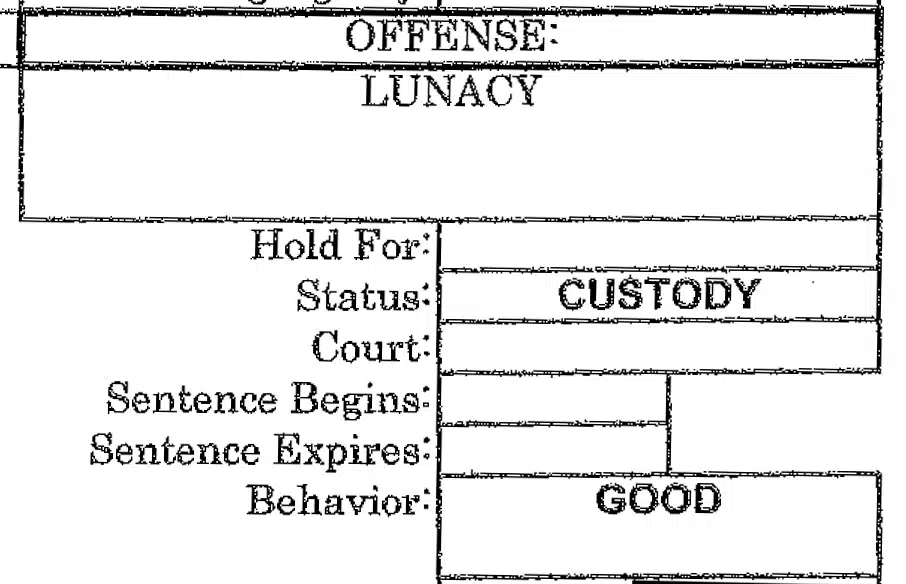
In every state, people who present a threat to themselves or others can be ordered to receive mental health treatment. Most states allow people with substance abuse problems to be ordered into treatment, too. The process is called civil commitment.
But Mississippi Today and ProPublica could not find any state other than Mississippi where people are routinely jailed without charges for days or weeks during that process.
What happened to Sons has occurred hundreds of times a year in the state.
The news organizations examined jail dockets from 19 Mississippi counties — about a quarter of the state’s 82 — that clearly marked bookings related to civil commitments. All told, people in those counties were jailed at least 2,000 times for civil commitments alone from 2019 to 2022. None had been charged with a crime.
Most were deemed to need psychiatric treatment; others were sent to substance abuse programs, according to county officials.
Since 2006, at least 13 people have died in Mississippi county jails as they awaited treatment for mental illness or substance abuse, Mississippi Today and ProPublica found. Nine of the 13 killed themselves. At least 10 hadn’t been charged with a crime.
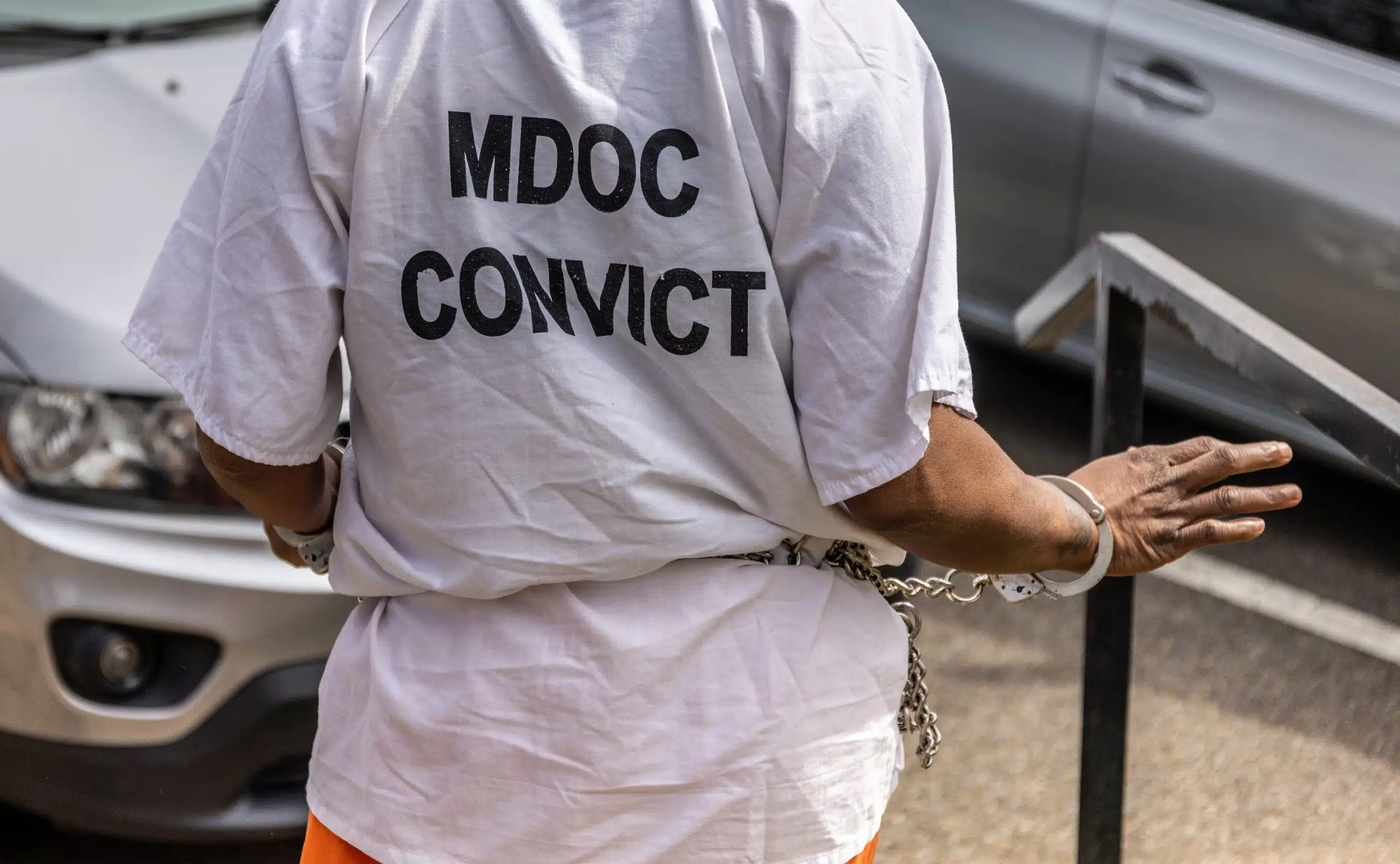
We shared our findings with disability rights advocates, mental health officials in other states and 10 national experts on civil commitment or mental health care in jails. They used words such as “horrifying,” “breaks my heart” and “speechless” when they learned how many people are jailed in Mississippi as they go through the civil commitment process.
Some said they didn’t see how it could be constitutional.
“If an ER is full, you don’t send people to jail,” said Megan Schuller, legal director of the Bazelon Center for Mental Health Law, a Washington, D.C.-based organization. “This is just outright discriminatory treatment in my view.”
Mississippi Today and ProPublica also interviewed 10 individuals who had been committed and jailed, as well as 20 family members.
Many of those people said they or their family members had been housed alongside criminal defendants. Nobody knew how long they would be there. They were often shackled when they left their cells. Some of them said they couldn’t access prescribed psychiatric medications or had minimal medical care as they experienced withdrawal from illegal drugs.
“It felt more criminal than, like, they were trying to help me,” said Richard Millwood, who was booked into the DeSoto County jail in 2020 following an attempted suicide. “I got the exact same treatment in there as I did when I was in jail facing charges. In fact worse, in my opinion, because at least when I was facing charges I could bond out.”
“I got the exact same treatment in there as I did when I was in jail facing charges. In fact worse, in my opinion, because at least when I was facing charges I could bond out.”
Richard Millwood, who was booked into jail following an attempted suicide
DeSoto County leadership, informed of Millwood’s statement, did not respond.
Millwood spent 35 days in jail before being admitted to a publicly funded rehab program 90 miles away.
Jimmy Sons didn’t receive a mental evaluation when he was booked into the Benton County jail in September 2015, according to documents in a lawsuit his father later filed. Less than 24 hours later, he was dead. Left alone in a cell without regular visits by jail staff, he had hanged himself.
He had been back in Mississippi for just a few days, planning to join his dad in electrical work, said his mother, Juli Murray. He had set out from her home in Bradenton, Florida, so early in the morning that he didn’t say goodbye.
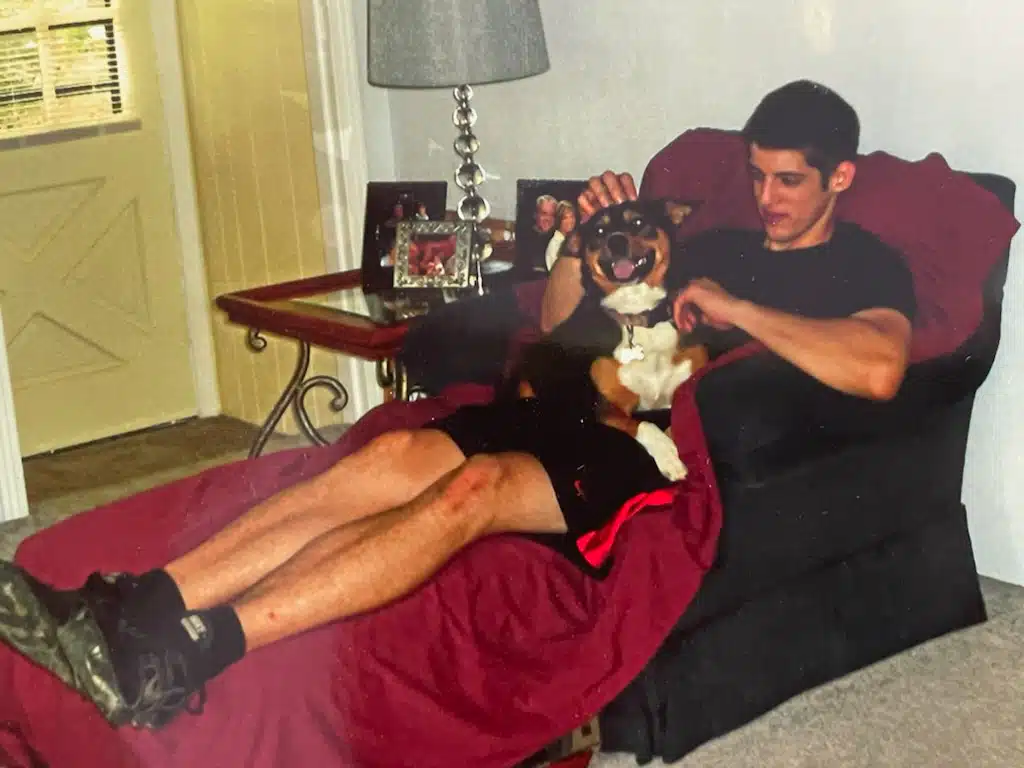
Murray remembers the phone call from Jimmy’s half-brother in which she learned her son was in jail. She didn’t understand why.
“If you do something wrong, that’s why you’re in jail,” she said. “Not if you’re not mentally well. Why would they put them in there?”
The Lesser Sin
When James Sons went to the clerk’s office in the tiny town of Ashland to file commitment paperwork for his son, he took the first step in Mississippi’s peculiar, antiquated system for mandating treatment for people with serious mental health problems.
It starts when someone — usually a family member, but it could be almost anyone — signs a form alleging that the person in question is “in need of treatment because the person is mentally ill under law and poses a likelihood of physical harm to themselves or others.”
James Sons filled out that form, listing why he was concerned: Jimmy’s guns, his threats, his talk of suicide.
Then a special master — an attorney appointed by a chancery judge to make commitment decisions — issued a “Writ to Take Custody.” It instructed sheriff’s deputies in Benton County, just south of the Tennessee border, to hold Jimmy Sons at the jail until he could be evaluated.
The sheriff’s office asked Sons to come in on an unrelated matter. When he showed up, Chief Deputy Joe Batts told him he needed a mental health evaluation. Batts tried to reassure Sons that the process would be as quick as possible and would end with him back home, according to Batts’ testimony in the lawsuit Sons’ father filed over his death.
Then Batts told Sons, “What we’re going to have to do now is take you back and book you.”
What he never told Sons, he later acknowledged in a deposition, was that the young man would have to wait in jail for days before he would see a mental health provider. The first screening required by law was four days away. If it concluded he needed further examination, he would be evaluated by two more medical professionals. Then the special master would decide whether to order him into treatment at a state psychiatric hospital.
The whole process should take seven to 10 days, according to the state Department of Mental Health. But sometimes it takes longer, the news organizations found. And if someone is ordered into treatment at their hearing, they generally have to wait for a bed, though the department says average wait times for state hospital beds after hearings have dropped dramatically in the last year.
While waiting for their hearing, people like Sons are supposed to receive treatment at a hospital or a short-term public mental health facility called a crisis stabilization unit. But state law does allow people to be jailed before their commitment hearing if there is “no reasonable alternative.” (The law is less clear about what’s allowed following a hearing.)

Mississippi Today and ProPublica spoke to dozens of officials across Mississippi involved in the commitment process: clerks who handle the paperwork, chancery judges and special masters who sign commitment orders, sheriffs who run the jails, deputies who drive people from jails to state hospitals, and the head of the state Department of Mental Health.
None of them thinks jail is the right place for people awaiting treatment for mental illness.
“We’re not a mental health hospital,” said Greg Pollan, president of the Mississippi Sheriffs’ Association and the sheriff of rural Calhoun County in the north of the state. “We’re not even a mental health Band-Aid station. That’s not what we do. So they should never, ever see the inside of my jail.”
Batts himself, who took Sons into custody in Benton County, said law enforcement officers across Mississippi “hate to detain people like that. But we’re told we have to do it.” He acknowledged that the facility “was substandard to begin with, not having the space and the adequate facilities to hold and monitor someone in that mental state — it just puts everybody in a bad situation.” And he said he thought the state could provide alternatives to jail.
Some counties jail most people going through the commitment process for mental illness, Mississippi Today and ProPublica found. Other counties reserve jail for people who are deemed violent or likely to hurt themselves. And at least a handful sometimes jail people committed for substance abuse — even though a 2021 opinion by the state’s attorney general says that isn’t allowed under state law.
This happens because until people are admitted to a state hospital, counties are responsible for covering the costs of the commitment process unless the state provides funding. If a crisis stabilization unit is full or turns someone away, the county must find an alternative, and it must foot the bill.
Counties can place patients in an ER or contract with a psychiatric hospital — and some do — but many officials balk at the cost. Many officials, particularly those in poor, rural counties, see jail as the only option.
“You have to put them somewhere to monitor them,” said Cindy Austin, chancery clerk in rural Smith County, located in central Mississippi. Chancery clerks are responsible for finding beds for people going through the commitment process. “It’s not that anybody wants to hold them in jail, it’s just we have no hospital here to hold them in.”
Timothy Gowan, an attorney who adjudicated commitments in Noxubee County from 1999 to late 2020, said people going through the commitment process there generally were jailed if they were determined to be violent and their family didn’t want them at home.
According to the Noxubee County jail docket, people going through the civil commitment process with no criminal charges were booked into the jail about 50 times from 2019 to 2022. Ten stays lasted at least 30 days. The longest was 82 days.
“Putting a sick person in a jail is a sin,” Gowan said. “But it’s the lesser of somebody getting killed.”
Some counties rarely hold people in jail — sometimes because a sheriff, chancery judge or other official has taken a stand against it. Rural Neshoba County in central Mississippi pays Alliance, a psychiatric hospital in Meridian, to house patients.
“We’re not a mental health hospital. We’re not even a mental health Band-Aid station. That’s not what we do. So they should never, ever see the inside of my jail.”
Greg Pollan, president of the Mississippi Sheriffs’ Association and sheriff of Calhoun County
The practice isn’t confined to poor, rural counties. DeSoto County, a populous, relatively wealthy county near Memphis, jailed people without charges about 500 times over four years, the most of any of the counties analyzed by Mississippi Today and ProPublica. The median jail stay there was about nine days; the longest was 106.
The state and county recently set aside money to build a crisis stabilization unit — currently, the nearest one is about 40 miles away — but the county and the local community mental health center haven’t decided on a location, said County Supervisor Mark Gardner.
Some county officials say that keeping people out of jail during the process requires the state to step up. State Rep. Jansen Owen, a Republican from Pearl River County in southern Mississippi who represents people during the commitment process, said he believes counties that spend “millions of dollars on fairgrounds and ballparks” could find alternatives to jail. But he also sees a need for more state-funded facilities.
“You can’t just throw it on the counties,” he said. “It’s a state prerogative. And them being held in the jail, I think, is a result of the state kicking the can down the road to the counties.”
Wendy Bailey, head of the state Department of Mental Health, said it’s “unacceptable” to jail people simply because they may need behavioral health treatment. Department staff have met with chancery clerks around the state to urge them to steer families away from commitment proceedings and toward outpatient services offered by community mental health centers whenever possible.
The Department of Mental Health says it prioritizes people waiting in jail when making admissions to state hospitals. The state has expanded the number of crisis unit beds from 128 in 2018 to 180 today, with plans to add more. And it has increased funding for local services in recent years in an effort to reduce commitments.
But Bailey said the department has no authority to force counties to change course, nor legal responsibility for people going through the commitment process until a judge orders them into treatment at a state psychiatric hospital.
Locked in the “Lunacy Zone”
Willie McNeese’s problems started after he came home to Shuqualak, Mississippi, a town of about 400 people and a lumber mill, in 2007. He had spent a decade in prison starting at age 17.
He found the changes that had taken place — bigger highways, cellphones — overwhelming, said his sister, Cassandra McNeese. He was eventually diagnosed with bipolar disorder.
“It’s like a switch — highs and lows,” said Willie McNeese, now 43. “I might have a whole lot of laughter going on, trying to make the next person laugh. Then my day going down, I be depressed and worried about situations that nobody can change but God.”
McNeese has been involuntarily committed in Noxubee County 10 times since 2008 and has been jailed during at least eight of them, one for more than a month in 2019 according to court records and the jail docket. During his most recent commitment starting in March 2022, McNeese was held in jail for a total of 58 days in two stints before eventually going to a state psychiatric hospital.

From 2019 to 2022, about 1,200 civil commitment jail stays in the 19 counties analyzed by Mississippi Today and ProPublica lasted longer than three days. That’s about how long it can take for people to start to experience withdrawal from a lack of psychiatric medications, which jails don’t always provide. About 130 stays lasted more than 30 days.
McNeese said he spent much of his time in jail last year standing near the door of his cell, what jail staff called the “Lunacy Zone,” screaming to be allowed to take a shower. A jailer tased him to quiet him down, and his clothes were taken from him. For a period, his mattress was taken, too.
“It’s a way of punishment,” he said. “They don’t handle it like the hospital. If you have a problem in the hospital they’ll come with a shot or something, but they don’t take your clothes or take your mattress or lock your door on you or nothing like that.”
McNeese said he had inconsistent access to medication and received none during his first stay in 2022, which lasted 25 days.
The Noxubee County Sheriff’s Department did not respond to questions about McNeese’s allegations.
Staff from Community Counseling, the community mental health center where McNeese had regular appointments, could have provided him with medication, but McNeese said no one from the center came to visit him in jail. A therapist at Community Counseling said staff go to the jail only when they’re called, usually when there’s a problem jail staff can’t handle. Rayfield Evins Jr., the organization’s executive director, said when he recently worked in Noxubee, deputies brought people from the jail to his facility for medication and treatment.
“If you have a problem in the hospital they’ll come with a shot or something, but they don’t take your clothes or take your mattress or lock your door on you or nothing like that.”
Willie B. McNeese, jailed multiple times following a diagnosis of bipolar disorder
Mental health advocates in Mississippi and other people who have been jailed during the commitment process said the limited mental health treatment McNeese received is common.
Mental health care varies widely from jail to jail, and no state agency sets requirements for what care must be provided. Jails can refuse to distribute medications that are controlled substances, which includes anti-anxiety medications like Xanax. The state Department of Mental Health says counties should work with community mental health centers to provide treatment to people waiting in jail as they go through the commitment process.
But those facilities generally don’t have the resources to provide services in jails, said Greta Martin, litigation director for Disability Rights Mississippi.
Martin’s organization, one of those charged by Congress with advocating for people with disabilities in each state, investigates county jails when it receives complaints. “We are not seeing any indication that these individuals are getting any mental health treatment while they are being held in these county facilities,” she said.

McNeese said those jail stays added physical discomfort and pain to the delusions that got him committed in the first place. “Then you get to the mental hospital — they have to straighten you all the way back over again,” he said.
Since being released from the state hospital last year, McNeese said, he has been doing well. He is now living in Cincinnati with his wife.
Scott Willoughby, the program director at South Mississippi State Hospital in Purvis, said it can be hard to earn patients’ trust when they arrive at the psychiatric hospital from jail.
At his facility, patients sleep two to a room in a hall decorated with photographs of nature scenes. Group counseling sessions are often held outside under a gazebo. In between, patients draw and paint during recreational therapy.
Willoughby has spoken with patients who had attempted suicide and were shocked to find themselves in jail as a result.
“People tend to associate jail with punishment, which is exactly the opposite of what a person needs when they’re in a mental health crisis,” he said. “Jail can be traumatic and stigmatizing.”
“I’m More Scared of Myself”
When Sons learned that he was going to be booked, he became anxious about being locked in a cell, Batts testified. So he was assigned to an area of the jail reserved for trusties — inmates who are allowed to work, sometimes outside the jail, while they serve their sentences.
On the afternoon of his first day in jail, Sons was sitting on his bed when a trusty named Donnie Richmond returned from work. Richmond said in a deposition that he asked a deputy who the new guy was.
“You better watch him,” Richmond recalled the deputy telling him. “He kind of off a little bit.”
Richmond offered Sons a cigarette and cookies and asked him why he was there. Sons took a cigarette and told Richmond the deputies had said he would hurt someone.
“He was like, ‘Man, I’m going to be honest with you,’” Richmond testified. “‘I ain’t going to hurt no one. I’m more scared of myself, of hurting myself.’”
Sons was not placed on suicide watch. The jail’s suicide prevention policy applied only to those who had attempted suicide in the jail, although attorneys for the jail officials in the lawsuit over his death said there was an unwritten policy to closely monitor people going through the commitment process.

That evening, Sons told a jailer he was feeling anxious around the other men. He asked to be moved to a cell by himself.
A guard took him to a cinder block cell with no windows. There was no television and nothing to read. He was given a blanket.
A security camera in Sons’ cell was supposed to allow jail staff to watch him at all times. But jail officials said in depositions that no one noticed anything unusual the next morning.
At 11:28 a.m., Sons rose from his bunk bed, walked to the door and placed his ear near it. He went back to his bunk, fashioned a noose and tied it around his neck. He sat there for three minutes before hanging himself, according to a narrative of the video in court records.
He stopped moving just before 11:38 a.m. A trusty serving lunch peeked through a tray opening in the door 48 minutes later and saw his body.

Sons’ father sued Benton County, the sheriff and several of his employees over his death. The defendants denied in court filings that they were responsible, but the county’s insurance company eventually settled the case for an undisclosed sum. (All that’s publicly known is that the county paid a $25,000 policy deductible toward defense costs.)
Sheriff’s department staff said in depositions they had kept an eye on Sons, but they couldn’t watch the video feed constantly. Lawyers for the defendants said there was no evidence sheriff’s department employees knew someone could kill himself in the way Sons did.
Sheriff A. A. McMullen, who is no longer in office, acknowledged in a deposition that “any mental commitment is a suicide risk,” but he said he wasn’t sure it would have made a difference if Sons had been placed on suicide watch.
“You could write up the biggest policy in the world and you couldn’t prevent it. There’s no way. God knows, you know, it hurts us,” he said. “If they’re going to do it, they’re going to do it.”
McMullen couldn’t be reached for comment for this story.
In an interview, jail administrator Kristy O’Dell, who joined the department after Sons died, said the jail still holds two or three people going through the commitment process each month.
John S. Farese, an attorney for Benton County, told Mississippi Today and ProPublica that the county, like others, “does the best they can do with the resources they have to abide by the laws” regarding commitments. He said the sheriff and the county will try to adapt to any changes in the law “while still being mindful of our limited personnel and financial resources.” He declined to comment on the specifics of the Sons case, which he didn’t work on.
Murray, Sons’ mother, was at a grocery store around noon the day her son died. As she picked out a watermelon, she thought about him, a fitness buff who loved fruits and vegetables. A strange thought crossed her mind: “Jimmy’s never going to eat watermelon again.”
When she got home, she got the call that he was gone.
John Sons, Jimmy’s half-brother, wrote in a text to Mississippi Today and ProPublica that the family is left with “complete and total guilt for putting him in the prison and always the wonder if we would not have done that move, if he would be with us today.”
But Richmond, the trusty who briefly shared a cell with Sons, testified that it was jail staff who “messed up.”
“He hung himself,” Richmond said. “I say this. God forgive me if I’m wrong. We couldn’t have saved that man from killing himself, but we could have saved that man from hanging himself in that jail.”
How we reported this story
No one in Mississippi has ever comprehensively tracked the number of people jailed at any point during the civil commitment process, according to interviews with dozens of state and county officials.
Last year, the state Department of Mental Health released, for the first time, a tally of people who were admitted to a state hospital directly from jail following civil commitment proceedings. The department tracked 734 placements in fiscal year 2022. (Under a law that takes effect this year, every county must regularly report to the department data regarding how often people are held in jail both before and after their commitment hearings.)
But that figure understates the scope of commitments. It doesn’t include people who were sent places other than a state hospital for treatment or who were released without being treated, and it counts only the time people spent in jail after their hearings. People can be jailed for 12 days before a commitment hearing, or longer if a county doesn’t follow the law.
County jail dockets can provide a more comprehensive picture, so Mississippi Today and ProPublica requested them from 80 of Mississippi’s 82 counties. Seventeen counties provided dockets that clearly marked bookings related to civil commitments — with notes including “writ to take custody,” “mental writ” and “lunacy.” In two more counties, we reviewed dockets in person.
Many counties didn’t respond, said their records were available only on paper or declined to provide records. Some cited a 2007 opinion by the state attorney general that sheriffs may choose not to enter the names of people detained during civil commitment proceedings onto their jail dockets.
After cleaning and standardizing the data from the dockets, we counted the number of jail stays involving civil commitments in which the person was not booked for a criminal charge on the same day. (We ended up excluding about 750 civil commitments for that reason.) If the dockets provided booking and release dates, we calculated the duration of jail stays.
Our count of commitments includes those for both mental illness and substance abuse. None of the jail dockets specified which commitment process people were going through, although some county officials said they don’t jail people committed for substance abuse and haven’t for years.
State laws regarding commitment for mental illness and substance abuse are different, but in many counties they were handled similarly until late 2021. That’s when the Mississippi attorney general’s office said state law didn’t allow people going through the drug and alcohol commitment process to be jailed.
To identify deaths of individuals held in jail during the civil commitment process, we reviewed news articles and federal court records. We also reviewed nearly 90 investigations of jail deaths from the Mississippi Bureau of Investigation. Most of the deaths had not previously been publicly reported.
For our survey of practices in other states, we contacted agencies overseeing mental health and disability advocacy organizations in every state and Washington, D.C. We received responses from one or the other in every location, and we received responses from both in 33. We also searched for news reports of similar cases in other states.
Do you have a story to share about someone who went through the civil commitment process in Mississippi? Contact Isabelle Taft at itaft@mississippitoday.org or call her at 601-691-4756.
This article first appeared on Mississippi Today and is republished here under a Creative Commons license.
Mississippi Today
Ex-MPB leader says ‘Sesame Street’ enriched his young life, but he worries for future of public broadcasting
Editor’s note: This essay is part of Mississippi Today Ideas, a platform for thoughtful Mississippians to share fact-based ideas about our state’s past, present and future. You can read more about the section here.
I was 7 years old when those funny-looking characters appeared on our black-and-white TV set. We lived in what the Tupelo city folk considered the country. If there was such a thing as cable, we surely didn’t know anything about it. The only static-free channel on our dial was the NBC affiliate, and that’s because the station on Beech Springs Road was barely a mile from our house. Suddenly, there was this new station – PBS.
Those funny-looking characters were from this new show called “Sesame Street,” and they had me hooked from the first day. Of course, I was happy to have another TV choice. But this one was different. Skillfully included in the humorous scenes with Ernie and Bert, Oscar the Grouch, Cookie Monster and Big Bird were educational messages that proved educationally life-changing for my family and me.
PBS aired “Sesame Street” – the same PBS that helped teach scores of children in our nation, including me, to read. And it’s the same PBS and member stations that just had their two-year forward-funding appropriation yanked by a $9 billion GOP-led rescission bill that finally succeeded in doing what “Sesame Street” teaches against – bullying.
After a long media career, including more than a decade as editor of The Clarion-Ledger, I spent another decade as executive director of Mississippi Public Broadcasting. It was one of my proudest moments for a kid from Saltillo, a child who came from a family of sharecroppers, to occupy the top seat in public broadcasting in my home state and to ultimately get elected to PBS’s national board of directors.
A kid who admired public media became an executive who ran a statewide operation and helped shape policy nationally. It felt like a dream.
For those who care as much as I do about public media, it is unfathomable, inconceivable and plain dumb – choose your adjective – that both PBS and NPR stations are being picked on, possibly dismantled. And for what? Their financial impact on the multi-trillion-dollar federal budget is minuscule. The inexplicable action carried out by the GOP majority has hurt me deeply. While Republican members run home on recess to avoid further questions about Jeffrey Epstein, my mind can’t get away from the inevitable obliteration of content from local stations that looms.
PBS and NPR are certainly weakened by the passage of the recission, but it will be the rural stations in rural towns without wealthy donors that will feel the most pain. It is a foregone conclusion that some stations already barely getting by will close.
One industry executive described the cuts as “catastrophic, devastating, unnecessary and mean-spirited.” Several stations have already had layoffs and there will be more.
The Corporation for Public Broadcasting, which announced Aug. 1 that it will begin shutting down in September, has been the congressional arm doling out funds to stations since 1967. For years, despite the shortsightedness of some members of Congress, CPB, with the assistance of affinity groups, fought off funding threats and delivered to the 1,500 stations federal dollars that were their lifeline.
Not this time.
The recent action to claw back the $1.1 billion public broadcasting receives over two years is a blow that most likely will place the industry as we know it in an unrecoverable position.
The public media system and local stations have led the way in delivering some of the country’s best programming. PBS, for example, was among the first to bring to viewers travel shows, DIY content, cooking shows featuring cultural icons like the great Julia Child. There’s also Bob Ross, with his soothing voice, who made us all believe that we, too, could paint beautiful landscapes.
The children’s programming, which my grandchildren faithfully watch, cannot be matched by those with commercial interests. It provides a safe place for children, which is not always the case with the others.
NPR frequently sets the agenda for the news of the day – often scooping better-financed media companies – with hosts and producers who have a knack for securing interviews with top newsmakers. Their aggressive reporting has always struck a nerve with thin-skinned politicians. As executive director of MPB, it was NPR that kept my phone ringing with lawmakers threatening to pull funding.
Public broadcasting will survive in some form. It has been wounded, but it has not been silenced. I would not be truthful, however, if I didn’t believe that its strong voice has been reduced to a whisper.
The American people have supported public broadcasting with their viewership and donations, the perfect public-private partnership. But I don’t believe small-town America can keep up. Some larger stations will struggle, as well.
So many people in my circle of friends have given their entire careers to public media. They won’t give up that easily. But they’ve been dealt a bad hand, a setback that has every station accountant working overtime to save as many people as they can.
What do I predict?
Expect to see mostly national programming and fewer local productions. Expect to see talented radio and TV professionals in the job market. But don’t expect to see public media and the ingenuity of its people give up. They will never quit.
Ronnie Agnew was named general manager of New Jersey Advance Media in 2022. He is a Mississippi native who has been in the media industry for more than 40 years. Agnew is a former executive editor of The Clarion-Ledger and former executive director of Mississippi Public Broadcasting. While editor of The Clarion-Ledger, Agnew received four President’s Rings, honoring editors in the Gannett Co. for exemplary performance. He also was honored with the Silver Em from the University of Mississippi. He is also a member of the University of Southern Mississippi Journalism Hall of Fame.
This article first appeared on Mississippi Today and is republished here under a Creative Commons Attribution-NoDerivatives 4.0 International License.
The post Ex-MPB leader says ‘Sesame Street’ enriched his young life, but he worries for future of public broadcasting appeared first on mississippitoday.org
Note: The following A.I. based commentary is not part of the original article, reproduced above, but is offered in the hopes that it will promote greater media literacy and critical thinking, by making any potential bias more visible to the reader –Staff Editor.
Political Bias Rating: Center-Left
The content expresses strong support for public broadcasting and criticizes recent funding cuts led by a GOP majority, framing these actions as harmful and shortsighted. It emphasizes the value of PBS and NPR in education and journalism, which aligns with a center-left perspective that typically favors public media funding and government support for educational and cultural institutions. The critique of Republican lawmakers and concern for rural communities further situates the piece within a center-left viewpoint without veering into extreme partisanship.
Mississippi Today
Brain drain: Mother understands her daughters’ decisions to leave Mississippi
Editor’s note: This Mississippi Today Ideas essay is published as part of our Brain Drain project, which seeks answers to Mississippi’s brain drain problem. To read more about the project, click here.
Back when I was a kid in 1988, my mama and I had an argument about what I wanted to major in at college.
I had dreamed of being a journalist since the age of 8. To me, that meant that I was going to Ole Miss, which had the journalism department.
My mama said I could only go away from home to Ole Miss if I was going to major in law.
So I settled on going to Mississippi State University just down the road and majoring in communication. She told me I should major in engineering since that’s what State was known for.
I said, “That’s even dumber than me going to law school. I hate math.”
“Well, you could at least try,” she said.
I said no. Then she told me I was wasting my education and turned her back on me.
I get it. She knew and I knew that I couldn’t stay in Choctaw County where I was raised and earn a living with that degree. I would have to go somewhere else — probably to the Jackson metro area and work for Gannett or the Associated Press. Or to Memphis. Or Biloxi. Or even New Orleans. She never really forgave me for moving to the Jackson metro, working in my field and raising her grandchildren so far from her.
After a while, I got used to the pace of life around here. I knew I probably wouldn’t ever move anywhere else because I noticed that people who left Mississippi often came back, whether due to family obligations or a realization that “somewhere else” wasn’t quite all it was cracked up to be.
I also noticed that a lot of people played up how they were from Mississippi while making a very good living being someplace else. I decided I wanted to prove you could be from Mississippi, live in Mississippi, work in Mississippi and make something of yourself without leaving Mississippi.
But I noticed something else over the years, too. Most of the kids in Brandon dreamed of going off from home to cities like Atlanta, Nashville, Dallas, DC, New York or Orlando. They didn’t seem to have reasons — just a desire to get away from the state as fast as they could.
Then my three daughters and I started having conversations about what they wanted to major in when they went to college. My oldest wanted to be a chef. My middle one was undecided between chemical engineering and landscape architecture. And my youngest was fascinated with roads and bridges.
I was all too aware of what had happened in the job markets in Mississippi since I had come up. Companies closed operations in a globalized economy and fled to cheaper labor markets. The advent of the internet meant employers could hire from all over the world. Longtime business leaders retired and sold out to big corporations that reduced investments in local communities that had supported those businesses for decades and then complained that those towns didn’t offer enough amenities for their employees to want to relocate there.
But the reality really set in when my chef daughter chose her first internship — in historic Williamsburg, Virginia.
I would never have dreamed of driving that far from home to try out a place to work when I was her age. Then after her senior year, she interned at Walt Disney World and got hired full-time before the internship was over. She was off to live in Orlando where now with her husband and young son she’s creating community and loves going to work every day with a pretty enviable benefits package, too, a thing unheard of in the culinary world in Mississippi.
My middle one finally settled on chemical engineering and was picked for a co-op job in her first semester at age 18 at a company in Georgia. When she graduated four years later, we packed her off to Indiana for a research and development job, and she now lives in New Hampshire with her husband, making six figures a year at 26 years old and looking forward to partaking in the cultural offerings in New York City when she can.
The youngest is currently in college for civil engineering, and I’m bracing myself for the inevitable. She doesn’t want to work for state government, so she’s likely going out of state as well. Her comment about coming back to Jackson metro was the most damning of all. “There’s nothing to do here,” she says.
A lot of people ask me questions: How often do you see your daughters? How can you stand being so far from your grandson? Don’t they at least come home for Christmas?
The answer to all of those questions is that we do the best we can. We text, we message on Facebook, we talk on the phone at least once a week, every Sunday. We arrange visits; sometimes it’s us driving to them while other times they drive to us.
I can’t imagine making my children as miserable as my mom made me over my life choices. We are flexible, understanding, and very, very proud of our daughters, who are grappling with enough in their lives without us loading them down with guilt over when they are coming home.
The calculus may change in the future. We may have declines in health and need to move closer to one of our children if we need assistance. Or we may need to be in assisted living care here in Mississippi where such care may be marginally cheaper than wherever our girls land.
But I don’t wish our girls had settled for life in Mississippi.
What I wish is that Mississippi could find a way to live up to its potential — to be a place more worthy of my daughters’ loyalty, affections and investment in themselves.
Maybe it will be someday. I hope so, for all of our sakes.
Julie Liddell Whitehead lives and writes from Mississippi. An award-winning freelance writer, Julie covered disasters from 9/11 to Hurricane Katrina throughout her career. Her first book is “Hurricane Baby: Stories,” published by Madville Publishing. She writes on mental health, mental health education and mental health advocacy. She has a bachelor’s degree in communication, with a journalism emphasis, and a master’s degree in English, both from Mississippi State University. In 2021, she completed her MFA from Mississippi University for Women.
This article first appeared on Mississippi Today and is republished here under a Creative Commons Attribution-NoDerivatives 4.0 International License.
The post Brain drain: Mother understands her daughters' decisions to leave Mississippi appeared first on mississippitoday.org
Note: The following A.I. based commentary is not part of the original article, reproduced above, but is offered in the hopes that it will promote greater media literacy and critical thinking, by making any potential bias more visible to the reader –Staff Editor.
Political Bias Rating: Center-Left
This essay reflects a Center-Left perspective by focusing on social and economic challenges faced by Mississippi, such as brain drain, job market changes, and community decline. The tone is empathetic and advocates for investment in local opportunities and amenities to retain talent, aligning with progressive concerns about economic inequality and regional development. However, it remains largely personal and reflective rather than explicitly ideological or partisan. The article critiques systemic economic shifts without advancing a polarized political agenda, emphasizing hope for future improvement and a more supportive environment for young professionals.
Mississippi Today
After 30 years in prison, Mississippi woman dies from cancer she says was preventable
Behind Bars, Beyond Care:
A Mississippi Today investigation into suffering, secrecy and the business of prison health care
Susie Balfour, diagnosed with terminal breast cancer two weeks before her release from prison, has died from the disease she alleged past and present prison health care providers failed to catch until it was too late.
The 64-year-old left the Central Mississippi Correctional Facility in December 2021 after more than 30 years of incarceration. She died on Friday, a representative for her family confirmed.
Balfour is survived by family members and friends. News of her passing has led to an outpouring of condolences of support shared online from community members, including some she met in prison.
Instead of getting the chance to rebuild her life, Balfour was released with a death sentence, said Pauline Rogers, executive director of the RECH Foundation.
“Susie didn’t just survive prison, she came out fighting,” Rogers said in a statement. “She spent her final years demanding justice, not just for herself, but for the women still inside. She knew her time was limited, but her courage was limitless.”
Last year, Balfour filed a federal lawsuit against three private medical contractors for the prison system, alleging medical neglect. The lawsuit highlighted how she and other incarcerated women came into contact with raw industrial chemicals during cleaning duty. Some of the chemicals have been linked to an increased risk of cancer in some studies.
The companies contracted to provide health care to prisoners at the facility over the course of Balfour’s sentence — Wexford Health Sources, Centurion Health and VitalCore, the current medical provider — delayed or failed to schedule follow-up cancer screenings for Balfour even though they had been recommended by prison physicians, the lawsuit says.
“I just want everybody to be held accountable,” Balfour said of her lawsuit. “ … and I just want justice for myself and other ladies and men in there who are dealing with the same situation I am dealing with.”
Rep. Becky Currie, who chairs the House Corrections Committee, spoke to Balfour last week, just days before her death. Until the very end, Balfour was focused on ensuring her story would outlive her, that it would drive reforms protecting others from suffering the same fate, Currie said.
“She wanted to talk to me on her deathbed. She could hardly speak, but she wanted to make sure nobody goes through what she went through,” Currie said. “I told her she would be in a better place soon, and I told her I would do my best to make sure nobody else goes through this.”
During Mississippi’s 2025 legislative session, Balfour’s story inspired Rep. Justis Gibbs, a Democrat from Jackson, to introduce legislation requiring state prisons to provide inmates on work assignments with protective gear.
Gibbs said over 10 other Mississippi inmates have come down with cancer or become seriously ill after they were exposed to chemicals while on work assignments. In a statement on Monday, Gibbs said the bill was a critical step toward showing that Mississippi does not tolerate human rights abuses.
“It is sad to hear of multiple incarcerated individuals passing away this summer due to continued exposure of harsh chemicals,” Gibbs said. “We worked very hard last session to get this bill past the finish line. I am appreciative of Speaker Jason White and the House Corrections Committee for understanding how vital this bill is and passing it out of committee. Every one of my house colleagues voted yes. We cannot allow politics between chambers on unrelated matters to stop the passage of good common-sense legislation.”
The bill passed the House in a bipartisan vote before dying in the Senate. Currie told Mississippi Today on Monday that she plans on marshalling the bill through the House again next session.
Currie, a Republican from Brookhaven, said Balfour’s case shows that prison medical contractors don’t have strong enough incentives to offer preventive care or treat illnesses like cancer.
In response to an ongoing Mississippi Today investigation into prison health care and in comments on the House floor, Currie has said prisoners are sometimes denied life saving treatments. A high-ranking former corrections official also came forward and told the news outlet that Mississippi’s prison system is rife with medical neglect and mismanagement.
Mississippi Today also obtained text messages between current and former corrections department officials showing that the same year the state agreed to pay VitalCore $100 million in taxpayer funds to provide healthcare to people incarcerated in Mississippi prisons, a top official at the Department remarked that the company “sucks.”
Balfour was first convicted of murdering a police officer during a robbery in north Mississippi, and she was sentenced to death. The Mississippi Supreme Court reversed the conviction in 1992, finding that her constitutional rights were violated in trial. She reached a plea agreement for a lesser charge, her attorney said.
As of Monday, the lawsuit remains active, according to court records. Late last year Balfour’s attorneys asked for her to be able to give a deposition with the intent of preserving her testimony. She was scheduled to give one in Southaven in March.
Rogers said Balfour’s death is a tragic reminder of systemic failures in the prison system where routine medical care is denied, their labor is exploited and too many who are released die from conditions that went untreated while they were in state custody.
Her legacy is one RECH Foundation will honor by continuing to fight for justice, dignity and systemic reform, said Rogers, who was formerly incarcerated herself.
This article first appeared on Mississippi Today and is republished here under a Creative Commons Attribution-NoDerivatives 4.0 International License.
The post After 30 years in prison, Mississippi woman dies from cancer she says was preventable appeared first on mississippitoday.org
Note: The following A.I. based commentary is not part of the original article, reproduced above, but is offered in the hopes that it will promote greater media literacy and critical thinking, by making any potential bias more visible to the reader –Staff Editor.
Political Bias Rating: Center-Left
This article presents a critical view of the Mississippi prison health care system, highlighting systemic failures and medical neglect that led to the death of a formerly incarcerated woman. The tone and framing focus on social justice issues, prisoner rights, and the need for government accountability and reform, which align with Center-Left values emphasizing government responsibility for vulnerable populations. While the article is largely investigative and fact-based, its emphasis on advocacy for reform, criticism of privatized prison health contractors, and highlighting bipartisan legislative efforts suggest a Center-Left leaning perspective rather than neutral reporting.
-
Mississippi Today6 days ago
After 30 years in prison, Mississippi woman dies from cancer she says was preventable
-
News from the South - Texas News Feed6 days ago
Texas redistricting: What to know about Dems’ quorum break
-
News from the South - North Carolina News Feed4 days ago
Two people unaccounted for in Spring Lake after flash flooding
-
News from the South - Florida News Feed7 days ago
Warning for social media shoppers after $22K RV scam
-
News from the South - Georgia News Feed7 days ago
Georgia lawmakers to return this winter to Capitol chambers refreshed with 19th Century details
-
News from the South - Georgia News Feed6 days ago
29-year-old killed after driving off road in 'dangerous' section road | FOX 5 News
-
News from the South - Texas News Feed7 days ago
Pritzker says Texas Democrats who fled state will be protected amid arrest threats
-
Mississippi Today6 days ago
Brain drain: Mother understands her daughters’ decisions to leave Mississippi










































